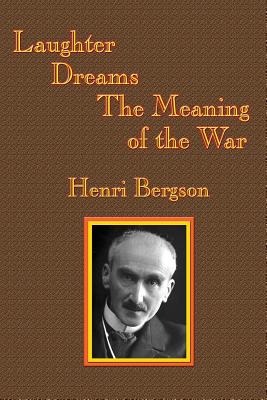Laughter / Dreams / The Meaning of the War

Laughter / Dreams / The Meaning of the War
In Laughter: An Essay on the Meaning of the Comic (first published in 1900), Henri Bergson develops a theory not of laughter itself, but of how laughter can be provoked. He describes the process of laughter (refusing to give a conceptual definition which would not approach its reality), used in particular by comics and clowns, as caricature of the mechanistic nature of humans (habits, automatic acts, etc.), as one of the two tendencies of life (degradation towards inert matter and mechanism, and continual creation of new forms). However, Bergson warns us that laughter's criterion of what should be laughed at is not a moral criterion and that it can in fact cause serious damage to a person's self-esteem. This essay made his opposition to the Cartesian theory of the animal-machine obvious.
Monty Python co-founder John Cleese recommends Laughter, telling us Bergson says "it's a social sanction because we laugh together as a group in society, and it's a sanction because we're trying to get people to behave flexibly."
This volume also includes the short lectures "Dreams" and "The Meaning of the War," which was delivered as the presidential address to the Académie des sciences morales et politiques in December 1914.
French philosopher Henri-Louis Bergson (1859-1941) was influential in the tradition of continental philosophy, especially during the first half of the 20th century until the Second World War. Bergson is known for his arguments that processes of immediate experience and intuition are more significant than abstract rationalism and science for understanding reality.
He was awarded the 1927 Nobel Prize for Literature "in recognition of his rich and vitalizing ideas and the brilliant skill with which they have been presented." In 1930, France awarded him the Grand-Croix de la Legion d'honneur.
PRP: 107.89 Lei
Acesta este Prețul Recomandat de Producător. Prețul de vânzare al produsului este afișat mai jos.
97.10Lei
97.10Lei
107.89 LeiLivrare in 2-4 saptamani
Descrierea produsului
In Laughter: An Essay on the Meaning of the Comic (first published in 1900), Henri Bergson develops a theory not of laughter itself, but of how laughter can be provoked. He describes the process of laughter (refusing to give a conceptual definition which would not approach its reality), used in particular by comics and clowns, as caricature of the mechanistic nature of humans (habits, automatic acts, etc.), as one of the two tendencies of life (degradation towards inert matter and mechanism, and continual creation of new forms). However, Bergson warns us that laughter's criterion of what should be laughed at is not a moral criterion and that it can in fact cause serious damage to a person's self-esteem. This essay made his opposition to the Cartesian theory of the animal-machine obvious.
Monty Python co-founder John Cleese recommends Laughter, telling us Bergson says "it's a social sanction because we laugh together as a group in society, and it's a sanction because we're trying to get people to behave flexibly."
This volume also includes the short lectures "Dreams" and "The Meaning of the War," which was delivered as the presidential address to the Académie des sciences morales et politiques in December 1914.
French philosopher Henri-Louis Bergson (1859-1941) was influential in the tradition of continental philosophy, especially during the first half of the 20th century until the Second World War. Bergson is known for his arguments that processes of immediate experience and intuition are more significant than abstract rationalism and science for understanding reality.
He was awarded the 1927 Nobel Prize for Literature "in recognition of his rich and vitalizing ideas and the brilliant skill with which they have been presented." In 1930, France awarded him the Grand-Croix de la Legion d'honneur.
Detaliile produsului









